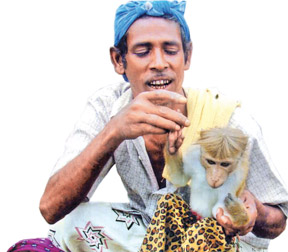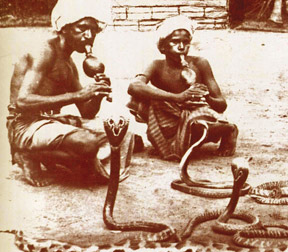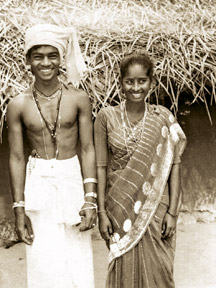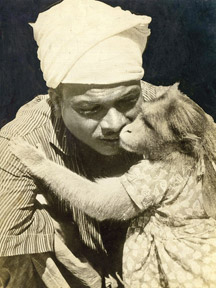|

Street entertainers with no permanent abode
By Ananda KANNANGARA
 The English term Gypsy (or Gipsy) is said to originate from the Greek
word for “Egyptian”. The Oxford Dictionary describes `Gypsies’ as a
small section of people that belong to a certain race who originally
lived in the Asian region. The English term Gypsy (or Gipsy) is said to originate from the Greek
word for “Egyptian”. The Oxford Dictionary describes `Gypsies’ as a
small section of people that belong to a certain race who originally
lived in the Asian region.
This tiny race did not have permanent dwellings. Since the world is
gradually changing, many families belonging to this group have
diminished in number or separated. Most gypsy families are now extinct
and minority gypsies are still living in many Asian countries, including
Sri Lanka, the Southern India, Nepal and Bangladesh.
Gypsies do not have permanent houses. They travel from place to place
and living in temporarily erected huts or in cadjan sheds. They travel
not only with their clan, but also with their belongings, including
clothes, kitchen utensils and their huts.
They treasure animals such as dogs, cattle and goats as a part of
their clan. Sometimes their belongings are carried by cattle and goats
on their back. They also use apes, cobras and varieties of snakes to
perform acrobatics on streets, at junctions and at village musical shows
for their living.
Many elderly females in gypsy families are astrologers. They are
experts in palm reading.
They say that they learned the art of palm reading from their
ancestors who lived in the Southern part of Sri Lanka and in Tamil Nadu
of India.
 Many people belonging to the gypsy clan in Sri Lanka have given up
their original mode of living and have now engaged in various other
employments such as in agricultural work, carpentry and masonry work,
garage and cycle repairing work, fishing industry and also in the
granite breaking industry. Many people belonging to the gypsy clan in Sri Lanka have given up
their original mode of living and have now engaged in various other
employments such as in agricultural work, carpentry and masonry work,
garage and cycle repairing work, fishing industry and also in the
granite breaking industry.
This tiny clan commonly named by the Sinhalese as Ahikuntakayo is
living in small huts and in caravans. Unlike huts and cadjan sheds,
caravans could be moved about easily. In Sri Lanka caravans in the
present day are used as food outlets as they could be moved into safer
places at night.
Gypsies generally live in lands that belong to others, especially in
abandoned State lands. They prefer State lands to private lands, since
owners of private lands are a hindrance to their ways of living.
Although Sri Lankans call them as Ahikuntakayo, people in Andra
Pradesh call them as `Romani’.
A book titled Ahikuntakayo, written by a Sri Lankan university
lecturer states that Andra Pradesh in India was the original birth place
of gypsies. The early gypsies were very fluent in Telingu Language which
was a popular language in Andra Pradesh.
Due to several changes in the society and the migration of certain
gypsy families towards other countries in the region such as Sri Lanka,
the later born gypsies started speaking Tamil Language which was the
popular Language in the Northern District. Thereafter they moved to the
Southern part of Sri Lanka and also the districts of Anuradhapura and
Polonnaruwa. Thereafter the gypsies used to speak both Sinhala and Tamil
Languages. Even today the gypsy community living in our villages could
speak both Sinhala and Tamil Languages.
 The Sunday Observer last week visited several places, such as
Payagala, Ambalangoda, Gampaha, Kirindiwela, Kesbewa and Piliyandala to
see the living standards of gypsy families. The Sunday Observer last week visited several places, such as
Payagala, Ambalangoda, Gampaha, Kirindiwela, Kesbewa and Piliyandala to
see the living standards of gypsy families.
As gypsy families live at one place for only a few weeks, it became a
difficult task even for the media to find their locations. Most members
of these gypsy families were reluctant to receive publicity through
media. They are of the view that getting publicity would become a
problem as they would be harassed by Police in the area and the
officials of Divisional Secretariats.
A leader of a Gypsy clan in Kalutara , 33-year old David Maranda said
gypsies are also living in several parts of Southern India and
Bangladesh.
“In Sri Lanka our families are permanently living at Anuradhapura,
Thambuttegama, Akkaraipattu, Nawalapitiya, Avissawella, Puttalam,
Negombo, Kochchikade , Chilaw, Trincomalee and Koslanda. They also
temporarilly live places such as Piliyandala, Kesbewa, Maharagama,
Payagala , Ambalangoda, Kalutara and Orugodawatta in Colombo”.
He said female members of their clan are getting married at ages
between 16 and 17 years and males are getting married at the age between
21 and 24 years.
David said he married twice and is having seven children.
“Some of my children are still studying at Thambuttegama and others
are engaged in odd jobs such as key cutting, key sharpening and selling
books and fruits inside buses,”.
David said his ancestors knew Telingu Language, but he knew only
Tamil and a smattering of Sinhala.
David also said some members of his clan are engaged in `Malayali
Gurukam’ (charms) and are also helping barren women to have children. He
said his father was given a token of appreciation by President Mahinda
Rajapaksa several years ago for the service rendered by him to the
society.
According to David, some males of the gypsy clan at Thambuttegama are
now engaged in snake charming and training monkeys to perform
acrobatics.
 David said the majority of women in his clan are engaged in palm
reading and also horoscope reading. David said the majority of women in his clan are engaged in palm
reading and also horoscope reading.
A member of a gypsy family at Piliyandala , 25-year old Relty Silva
said he is married and is having five children.
He said three of his children are going to school at Anuradhapura and
they are living with their grandparents who are cultivators.
“As it is difficult to earn money from snake charming, I have a small
machine for key cutting and to sharpen knives.”
He said there are nearly 900 gypsy families at Thambuttegama and
majority of them are engaged in agriculture and poultry farming.
He said gypsies belong to a traditional clan and requested Government
to provide them houses and agricultural lands in their homelands.
A gypsy woman, 31-year-old Sadee Leelawathi was very happy at the way
she lives with five families of their clan, in small huts.
She requested the authorities to provide them State lands to
construct permanent houses and also small lands to cultivate vegetables
and to start a poultry farm. She said she has five children and their
families need permanent abodes as they wish to send their children to
schools and help them do various permanent jobs in private companies or
any other place. A male gypsy, 41-year-old Judy Neesha said he married a
Sinhala woman in Kadugannawa following a long standing love affair and
is now having three children.
“My wife Sheela is coming from a poor family and her parents are
engaged in menial jobs.
I was a snake charmer. I met her while I was engaged in snake
charming in Kandy town. She knew the family life of gypsies and agreed
to marry me without the consent of her parents”.
Judy said that her parents gave their consent after 13 years and she
inherited a house and land at Kadugannawa and is now working in a
garment factory and drawing a monthly salary of Rs. 26,000. A 19 -year
old gypsy boy, S. Perumal of Ambalangoda said he is not engaged in snake
charming or palm reading jobs presently practised by his parents.
“I have my own bicycle repairing workshop in Ambalangoda town, but in
the evening I am staying with my parents in their small huts,”
He asked the public not to call their people `Ahikuntakayo ‘and
requested authorities to look into the welfare of their clan.
A leader of a gypsy clan, 45-year-old Rupert Rosemarin of Agalawatta
said he and a large number of their families wish to give up the gypsy
life and encourage other members to engage in jobs and getting married
to Sinhalese girls and boys.
Then the name of “Ahikuntakaya” will be vanished from the country one
day. |

